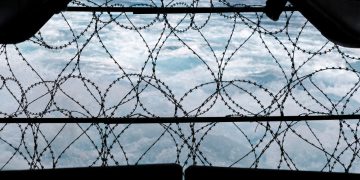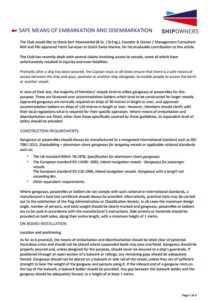As it has recently dealt with several claims involving access to vessels, the Shipowners’ Club issued a guide for the safe embarkation and disembarkation from vessels and gangway installation, to prevent injuries and even fatalities.
Promptly after a ship has been secured, the Captain must at all times ensure that there is a safe means of access between the ship and quay, pontoon or another ship alongside, to enable people to access the berth or another vessel.
The recommended measures concern the following:
- Gangways should be properly secured and, unless designed for the purpose, should never be secured to a ship’s guardrails. If positioned through an open section of a bulwark or railings, any remaining gaps should be adequately fenced. Gangways should also not be placed on a bulwark or side rail of the vessel, unless they are of sufficient strength to bear the weight of the gangway and persons using it.
- If the inboard end of a gangway rests on the top of the bulwark, a bulwark ladder should be provided. Any gap between the bulwark ladder and the gangway should be adequately fenced, to a height of at least 1 metre.
- The angle of inclination of a gangway should be kept within the limits for which it was designed and should not be used at an angle of more than 30° from horizontal (unless specifically designed and constructed for use at greater angles).
- Care should be taken when several persons are standing still on the gangway (e.g. on passenger ships). The maximum capacity of the gangway should never be exceeded.
- Adequate lighting should be provided to illuminate the means of embarkation and disembarkation, including the positions on deck and ashore.
- A lifebuoy, equipped with a self-igniting light and a buoyant lifeline, should be available for immediate use in the vicinity of the embarkation and disembarkation arrangement when in use.
- On seagoing ships, where it is possible that a person may fall from the means of embarkation and disembarkation or between the ship and quayside, a safety net should be mounted in way of the gangway.
- Even if it is not always required under local regulations for some ships to comply with the ISPS Code, it is good practice to have a member of the vessel’s crew permanently stationed at the gangway for safety and security purposes.
- Gangways should be properly maintained and inspected at appropriate intervals as required by international or national regulations and in accordance with manufacturers’ instructions.
It should be noted that flag states, governing authorities and ports may differ to the advice given in this publication, but the issue of ensuring safe access onto a vessel is a combination of exercising common sense and by managing all safety risks with due diligence by the ship owner, operator and the Captain.
Further details may be found in the following document:































































